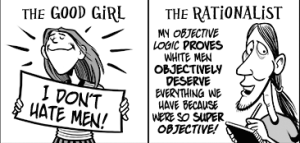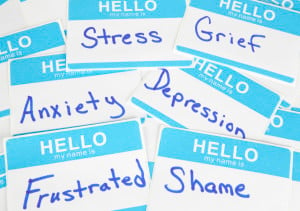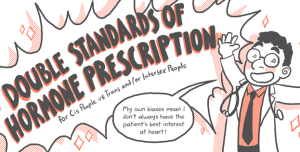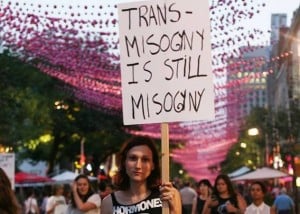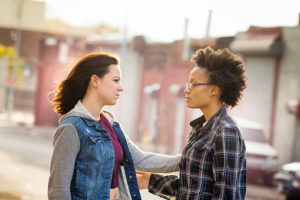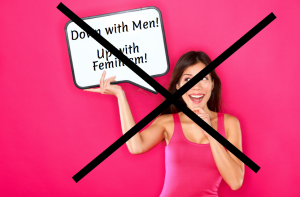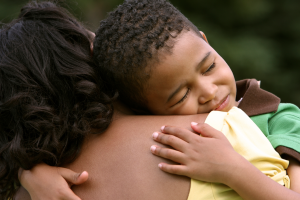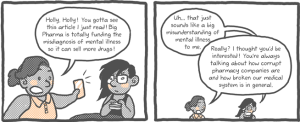
Credit: Black Love Forum
I disabled my YouTube comments.
“Really?” a friend of mine tweeted to me. “Doesn’t the comments section provide a real opportunity for discourse, other than the occasional jerk?”
I snorted. “Occasional?” I thought. More like frequent.
The decision to take such a drastic measure didn’t come easily. I weighed the pros and the cons. I asked myself the hard questions. I pondered if this would inhibit good people with good intentions from having a space for their voices.
But at the end of the day, despite some of the benefits, I decided that my own emotional well-being was (and should be!) my top priority. I was tired of logging into YouTube holding my breath, fearful of the backlash.
“I get far more comments akin to ‘back to the kitchen, whore!’ than ones that promote worthwhile discussion,” I tweeted back. “The bad outweighs the good.”
And for what? For what does the bad outweigh the good? For what do I receive death and rape threats, dozens of poorly-designed kitchen jokes, men explaining to me what women’s experiences really are, and “tits or gtfo?”
Well, for being a woman, for one. But for being a woman with a voice, the kind of woman worth silencing. For being one of the worst things that a woman can be in a patriarchal society.
For being a feminist.
The truth is, disabling my YouTube comments came easily, compared with my other often-fantasized solution: dropping out of the public eye entirely and holing up in a one-room shack with just my cat and my books for the rest of my life. (No, seriously, I think about it a lot – is that weird?)
But when I hit these roadblocks where I’m forced to evaluate my place in the world and the world’s place within me, there are two conclusions that I always come to.
One is that I always hold worth, regardless of what the anonymous Tumblr messages say.
The other is that the pain is real. The pain of being a feminist in an anti-feminist world is palpable.
And it stings.
Online backlash is one thing, though. It isn’t deserved or excusable, but it’s expected, given the number of assholes with high-speed connections. It’s easy enough to power down, block comments, convince yourself that the anonymous person who just told you that s/he hopes that you die a slow and agonizing death is just a sociopath.
But what about when the backlash is “IRL?” When it’s friends or family, the rude comments can leave you sick to your stomach.
It’s the anger that lights up inside of you when someone that you went to high school with, or an ex-flame, or your co-worker comments on the link that you posted on Facebook and tells you, in exasperated keystrokes, that you’re overreacting.
It’s the awkward silence that follows when, during a family function, your uncle proclaims that abortion is murder, and everyone turns to look at you, waiting for your reaction, but no one speaks up.
It’s when your own mother laughs at you and tells you to learn better coping skills when you tell her that you flipped off a street harasser.
Sometimes, in some circles, despite the amazing online feminist communities that are your safe spaces, you can feel awfully alone. Harassed. Attacked. Wholly disrespected.
And after a while, the pain can build into resentment, growing until you’re bursting at the seams, ready to go completely Carrie the next time someone suggests that feminism is a joke.
But you have a choice (and we feminists, we looove choice!). You can choose self-care.
Now, I’m not trying to say that being a feminist and receiving backlash for it is the worst thing that can happen to a person. It isn’t.
Most of us have dealt with stresses and pains much more serious than a rude back-to-the-kitchen joke.
And those of us who are marginalized in other ways – our sisters who are women of color or in the LGBTQ community, for instance – certainly (unfortunately) take the brunt of the hit. And they could tell you stories far worse than mine about how intersectionality plays into backlash, and how the more marginalized you are, the less seriously you’re taken.
But as a united group of feminists, I think that we can all agree that none of this backlash – no matter how big or how small – is appropriate and that all of it is painful.
It exists on a spectrum, for sure, but that entire spectrum sucks. And sometimes we can’t depend on the world around us to support us. Sometimes maybe we have to support ourselves.
So here are some ideas for self-care against feminist backlash:
1. Engage in a conversation if it feels safe and appropriate.
Maybe a discussion about privilege would help. Maybe someone needs to understand the history of the Women’s Movement and how it’s changed society. Maybe they don’t understand how the media plays a role in how we view feminists.
If you feel like you can talk to them in a safe and effective manner, then go ahead and do so!
But if you can’t or don’t want to…
2. Walk away. You haven’t failed feminism if you do.
Once, when I lived in the South, I had a friend of mine try to “save” me – you know, convert me to Christianity. I told him politely that my Agnosticism was set and that his attempts were fruitless.
His response? “Okay.” He explained that preaching to deaf ears isn’t going to help anybody, and that it was better for him to reserve his energy for people who he had a chance of convincing.
His walking away was the most respectful thing he could have done. And I use this example a lot when newer, younger feminists ask me for advice on how to get through to people.
Use your time and energy to talk to people who will listen, who are receptive. Those are the lives that you’ll really change.
And you’ll feel less like banging your head against a wall.
3. Try to see the good in people while still being aware of the bad.
Sometimes good people do bad things. Sometimes people don’t recognize when they’re being rude. And it’s important to recognize that no one person is all good or all bad.
Be aware of how their behavior is inappropriate, but don’t let that behavior define their entire being. This is especially important when dealing with friends and family.
Just because your dad believes in stereotypical gender roles doesn’t mean that he’s an awful person, right?
4. Stand up for yourself. You deserve respect.
If someone is being rude to you, point out that they’re being rude. You don’t have to start an argument with them. You can just say, “I’m sorry, but I’m finding it really difficult to engage in this conversation because I feel like you’re attacking me. When you are ready to treat me with respect then maybe we can talk about this again.”
And leave it at that. You don’t have to let someone belittle you. Let them know that’s uncool.
And let yourself know that it’s okay to assert boundaries and demand respect. Sometimes we fear that if we stand up for our right to be respected in a public forum, we’re showing “weakness” and failing as feminists.
I promise that there’s nothing anti-feminist about requesting to be spoken to and treated with respect.
5. Speak your truth. Don’t let your voice be silenced.
Your truth is just that – yours. Your experience is yours. Your story is yours. Your voice is yours.
Know that in your heart, and don’t let others try to steal that from you. Continue to use the truth and the voice that you have. Don’t let the jerks silence you. We need you!
And at the same time, you don’t need to say it out loud every single time. That would get exhausting. But you can still say it to yourself or to someone else who understands.
When someone attempts to take away your autonomy by diminishing your opinion (or, in some cases, your livelihood), you have a responsibility to yourself to take it back.
Finding your own way to deal with feminist backlash will help you do that.
And hey! If all else fails, we fellow feminists will always be here for commiseration.
Because regardless of someone else’s opinion, you do deserve respect. And if you’re going to demand it from anyone, demand it from yourself.
[do_widget id=”text-101″]
Melissa A. Fabello is the Co-Managing Editor for Everyday Feminism. She’s a domestic violence prevention and sexuality educator, eating disorder and body image activist, and media literacy vlogger based out of Philadelphia. She enjoys rainy days, Jurassic Park, and the occasional Taylor Swift song and can be found on YouTube and Tumblr. She holds a B.S. in English Education from Boston University and an M.Ed. in Human Sexuality from Widener University. She is currently working on her PhD. She can be reached on Twitter @fyeahmfabello. Read her articles here and book her for speaking engagements here.
Search our 3000+ articles!
Read our articles about:
Our online racial justice training
Used by hundreds of universities, non-profits, and businesses.
Click to learn more





